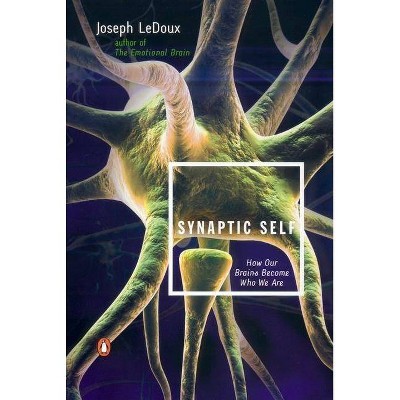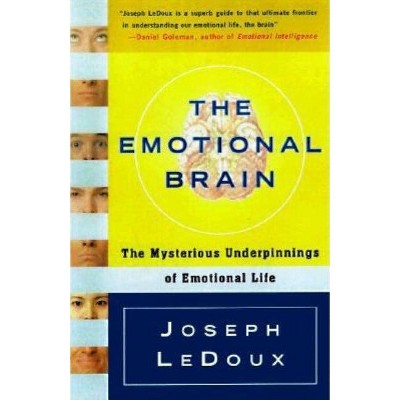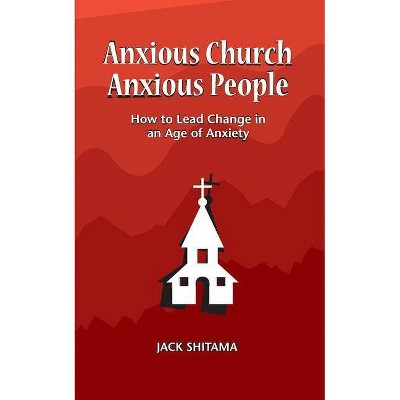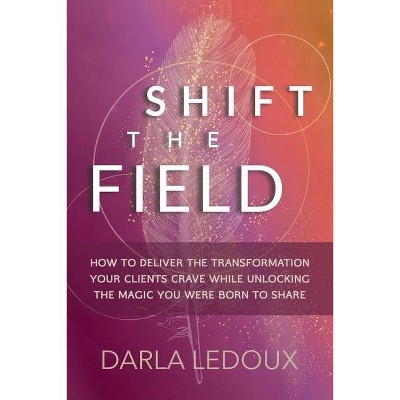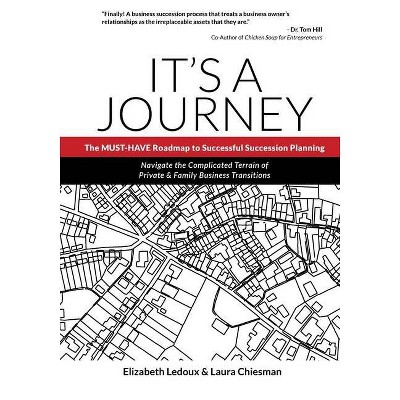Anxious - by Joseph LeDoux (Paperback)
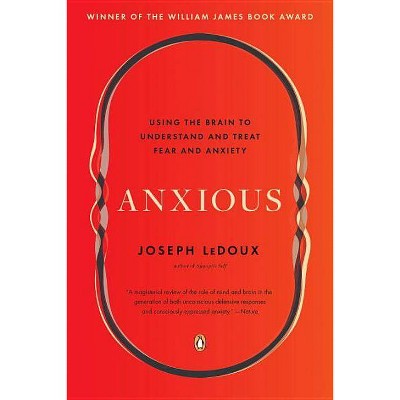
Similar Products
Products of same category from the store
AllProduct info
<p/><br></br><p><b> About the Book </b></p></br></br>Joseph LeDoux, whose NYU lab has been at the forefront of research efforts to understand and treat fear and anxiety, explains the range of anxiety disorders, their origins, and discoveries that can restore sufferers to normalcy.<p/><br></br><p><b> Book Synopsis </b></p></br></br><b>"A rigorous, in-depth guide to the history, philosophy, and scientific exploration of this widespread emotional state . . . [LeDoux] offers a magisterial review of the role of mind and brain in the generation of unconscious defense responses and consciously expressed anxiety. . . . [His] charming personal asides give an impression of having a conversation with a world expert." --<i>Nature</i></b><br><b> </b><br> <b>A comprehensive and accessible exploration of anxiety, from a leading neuroscientist and the author of <i>Synaptic Self</i></b> <p/> Collectively, anxiety disorders are our most prevalent psychiatric problem, affecting about forty million adults in the United States. In <i>Anxious</i>, Joseph LeDoux, whose NYU lab has been at the forefront of research efforts to understand and treat fear and anxiety, explains the range of these disorders, their origins, and discoveries that can restore sufferers to normalcy. <p/> LeDoux's groundbreaking premise is that we've been thinking about fear and anxiety in the wrong way. These are not innate states waiting to be unleashed from the brain, but experiences that we assemble cognitively. Treatment of these problems must address both their conscious manifestations and underlying non-conscious processes. While knowledge about how the brain works will help us discover new drugs, LeDoux argues that the greatest breakthroughs may come from using brain research to help reshape psychotherapy. <p/> A major work on one of our most pressing mental health issues, <i>Anxious</i> explains the science behind fear and anxiety disorders. <p/><b>Praise for <i>Anxious</i> </b> <p/>"[<i>Anxious</i>] helps to explain and prevent the kinds of debilitating anxieties all of us face in this increasingly stressful world." --Daniel J. Levitin, author of <i>The Organized Mind</i> and <i>This Is Your Brain on Music</i> <p/> "A careful tour through the current neuroscience of fear and anxiety . . . [<i>Anxious</i>] will reward the informed reader." --<i>The Wall Street Journal</i> <p/> "An extraordinarily ambitious, provocative, challenging, and important book. Drawing on the latest research in neuroscience (including work in his own laboratory), LeDoux provides explanations of the origins, nature, and impact of fear and anxiety disorders." --<i>Psychology Today</i><p/><br></br><p><b> Review Quotes </b></p></br></br><br><p>"Every age believes itself to be the age of anxiety, as Auden's famous poem first put it. But in his new book, <i>Anxious</i>, the neuroscientist and writer Joseph LeDoux suggests that that has never been a stronger claim to make than it is now . . . . If this is the age of anxiety, LeDoux is our Lewis and our Clark: It was LeDoux who laid down the first map of what is called the brain's 'fear circuit, ' the regions--centered on the amygdala and its adjacent structures--that together give rise to our ability to respond to threats and danger. But with his new book, he wants to redraw that map."<br><b>--Casey Schwartz</b><i><b>, New York Magazine</b> <p/></i>"Mr. LeDoux offers a careful tour through the current neuroscience of fear and anxiety. . . . [<i>Anxious</i>] will reward the informed reader."<br><b>--Leonore Tiefer<b>, </b><i>The Wall Street Journal</i></b> <p/>"LeDoux presents a rigorous, in-depth guide to the history, philosophy and scientific exploration of this widespread emotional state. . . . Neuroscientists, psychologists, philosophers and psychiatrists will find this exquisitely referenced book particularly useful. It is also a must-read for young investigators, and anyone perusing the footnotes will be rewarded with an insider's view of the state and evolution of anxiety research. LeDoux's charming personal asides give an impression of having a conversation with a world expert. LeDoux ends on a high note, describing how cutting-edge research on the neural substrates of anxiety is being translated into new approaches for psychiatric treatment."<br> <b>--Susanne Ahmari, <i>Nature</i></b><br><b><i><br></i></b>"LeDoux is not only a pioneer in the neurobiological analysis of fear in animals but also a scholarly and accessible writer. In <i>Anxious</i>, he systematically builds on his earlier works, covering with aplomb a vast literature on emotion, memory, attention, and consciousness. With that said, Anxious is a significant and important departure from the author's earlier views on the neural underpinnings of fear. . . . In <i>Anxious</i>, LeDoux challenges the reader to think differently about the neural origins of fear and its disorders. In doing so, he offers a masterful synthesis of animal and human work and a novel roadmap for future work in both the laboratory and the clinic."<br><b>--Stephen Maren, <i>Science</i></b> <p/><i>"Anxious</i> is an extraordinarily ambitious, provocative, challenging, and important book. Drawing on the latest research in neuro-science (including work in his own laboratory), LeDoux provides explanations of the origins, nature, and impact of fear and anxiety disorders."<br><b>--Glenn Altschuler, <i>Psychology Today<br></i></b><br>"Drawing on years of research, neuroscientist LeDoux delves into the subject of anxiety and fear, depicting both emotions as cognitive constructs. . . . [<i>Anxious</i>] will open up new worlds of thinking and feeling"<br> <i><b>--Publishers Weekly</b></i> <p/>"Wonderfully erudite, informative, and splendidly well written. Helps to explain and prevent the kinds of debilitating anxieties all of us face in this increasingly stressful world. Any author who can weave Leonard Bernstein, W. H. Auden, The Rolling Stones, and Alfred E. Neuman into a single illustrative example is on my short list for favorite writers ever."<br><b> --Daniel J. Levitin, author of <i>The Organized Mind </i>and <i>This Is Your Brain On Music</i></b> <p/> "Joseph LeDoux [is] the William James of our era. . . . This marvelous book is science at its best. It traces the evolution of a key set of scientific insights based on progressively better empirical data, most of these derived from LeDoux's brilliant studies, and applies these new insights to a family of clinically important phenomenon. <i>Anxious</i> is an absolute must read for clinicians and basic scientists as well as for anyone else interested in anxiety and its disorders."<br><b> --Eric R. Kandel, Kavli Professor and University Professor, Columbia University; Senior Investigator, Howard Hughes Medical Institute; author of<i> In Search of Memory</i> and <i>The Age of Insight</i>; recipient of the 2000 Nobel Prize in Physiology or Medicine</b> <p/> "An exquisite and unique attempt to truly relate how neural cells lead to felt conscious states in the human mind--the toughest problem in all of science. LeDoux has thrown down the gauntlet and set the standard. I wish all of us working on the problem luck trying to beat this analysis."<br><b> --Michael Gazzaniga, Professor of Psychology, University of California, Santa Barbara, and author of <i>Tales from Both Sides of the Brain</i>, <i>Human</i>, and <i>The Social Brain<br></i></b><br>"<i>Anxious</i> is a profound, exciting and immensely useful work about one of our most troubling--and puzzling--emotions. Joseph LeDoux takes us behind the scenes of our own minds to show us not only how anxiety is constructed in the brain but how it can be deconstructed. This is neuroscience at its very best: helpful and hopeful without a hint of hyperbole."<br><b><b>--Mark Epstein, M.D., author of </b><i>Thoughts without a Thinker</i><b> and </b><i>The Trauma of Everyday Life </i></b> <p/> "In this tour de force, LeDoux artfully guides the reader from the unconscious defensive system, through attention and memory, to the conscious experience of fear and anxiety. His traverse from the unconscious to the conscious experience of emotion is rich in scientific detail and yet exquisitely readable. LeDoux completes his masterpiece with provocative discussions of therapies for anxiety. This book is a fascinating revelation of the evolution in LeDoux's own scientific thinking and in the field at large and is a must read for any student of learning, memory or emotion."<br> <b>--Michelle G. Craske, Ph.D., Professor of Psychology and Director, Anxiety Disorders Research Center, UCLA </b> <p/>"LeDoux is a true leader in the field of cutting-edge neuroscience and psychology, yet he also has an uncanny ability to write beautifully and clearly. . . . A must-read for anyone interested in the intersection of the mind and brain, and how an understanding of psychology and neuroscience can change ourselves and the world around us!"<br><b>--Kerry J. Ressler, M.D., Ph.D., Professor of Psychiatry and Behavioral Sciences, Emory University; Scientific Council Chair, Anxiety and Depression Association of America; Investigator, Howard Hughes Medical Institute; Member, National Academy of Sciences</b> <p/><b>Praise for <i>Synaptic Self</i></b><br> "<i>Synaptic Self</i> represents a brilliant manifesto at the cutting edge of psychology's evolution into a brain science. Joseph LeDoux is one of the field's pre-eminent, most important thinkers."<br> <b>--Daniel Goleman, author of <i>Emotional Intelligence </i>and<i> Primal Leadership</i></b> <p/>"A clear, up-to-date, and impressively fair-minded account of what neuroscience has established about human nature."<br> <b>--Howard Gardner, </b> <b>John H. and Elisabeth A. Hobbs Professor of Cognition and Education at Harvard University and author of <i>Frames of Mind</i> and <i>Intelligence Reframed</i></b> <p/>"<i>Synaptic Self</i> is a wonderful tour of the brain circuitry behind some of the critical aspects of the mind. LeDoux is an expert tour guide and it is well worth listening. His perspective takes you deep into the cellular basis of what it is to be a thinking being."<br> <b>--Antonio R. Damasio, University Professor, David Dornsife Chair in Neuroscience and Professor of Psychology and Neurology, Director of the USC College Brain and Creativity Institute and author of <i>The Feeling of What Happens </i>and <i>Descartes' Error</i></b> <p/>"In this pathbreaking synthesis, Joseph LeDoux draws on dazzling insights from the cutting edge of neuroscience to generate a new conception of an enduring mystery: the nature of the self. Enlightening and engrossing, LeDoux's bold formulation will change the way you think about who you are"<br> <b>--Daniel L. Schacter, William R. Kenan, Jr. Professor of Psychology at Harvard University, author of <i>The Seven Sins of Memory </i>and <i>Searching for Memory</i> </b> <p/>"Starting with a synopsis of the evolving nature of the self in philosophy, psychology, and physiology . . . [LeDoux] addresses that most unwieldy of subjects through the empirical divinations of neuroscience. The core of his argument rests on synapses, the empty gaps that neurons bridge to form circuits. LeDoux's remarkably accessible descriptions of the process crackle like the electrical storms that rain chemical ooze on the brain. . . . [<i>Synaptic Self</i>] goes a long way in ordaining the steps to humanity's timeless tango with tautology."<br> <b>--Andy Battaglia, </b> <b><i>A.V. Club</i></b> <p/>"[A]n important contribution."<br> <b><i>--Publishers Weekly</i></b><br> <b><br>Praise for <i>The Emotional Brain</i></b> <p/>"Highly accessible, a stimulating and thoughtful work [that] is essential reading for any serious student of human nature."<br> <b>--Raymond J. Dolan, <i>Nature</i></b> <p/>"[<i>The Emotional Brain</i>] is vivid and convincing in its description of a central mechanism of emotion, and is directly applicable to understanding anxiety, the most common ingredient of emotional disorders. It's a terrifically good book."<br> <b>--Keith Oatley, <i>New Scientist</i></b> <p/>"With clarity and convincing logic, <i>The Emotional Brain</i> presents a new view of emotion that is derived in large part from the author's own ground-breaking research. . . . LeDoux shows how the study of the brain leaves our understanding of emotion richer than it was before.<br> <b>--Steven E. Hyman, M.D. Director, National Institute of Mental Health</b> <p/>"Engrossing and engaging."<br> <b>--Richard Restak, <i>The New York Times Book Review</i></b></p><br><p/><br></br><p><b> About the Author </b></p></br></br><b>Joseph LeDoux </b>is the Henry and Lucy Moses Professor of Science at New York University, where he is a member of the Center for Neural Science and the Department of Psychology. He directs the Emotional Brain Institute at New York University and at the Nathan Kline Institute, and is the author of <i>Synaptic Self </i>and <i>The Emotional Brain</i>. A member of the National Academy of Sciences, LeDoux lives in Brooklyn, New York.
Price History
Price Archive shows prices from various stores, lets you see history and find the cheapest. There is no actual sale on the website. For all support, inquiry and suggestion messages communication@pricearchive.us
